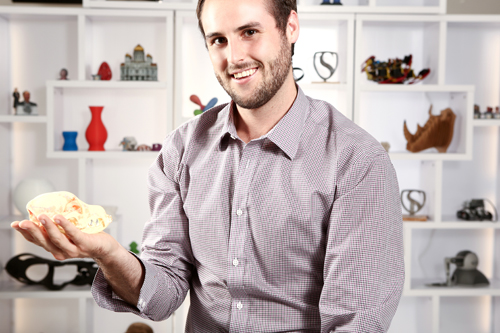
Adam Little had intended his speech to be touching but humorous. “Touching” turned out to be an understatement for one listener. His mom attended the closing ceremony for Little and his classmates in last summer’s graduate studies program at Singularity University (SU) in California.
Chosen as class spokesperson, Little delivered a “Letters to Mom” speech about what he calls his life-changing experience last summer. What did Mom say afterward? “She bawled her eyes out.”
Back in Guelph a few months later, Little still shakes his head over his experience this past summer.
He was still completing his DVM here last spring when he learned he’d been accepted to the SU summer program. From among several thousand applicants worldwide, he was one of 80 students from about 40 countries – and the only veterinarian — to take part in the prestigious program.
Based at the NASA Ames Research Center in Silicon Valley, the school runs curricula in emerging technologies, including biotechnology, computers, artificial intelligence and nanotechnology.
Little took part in the school’s fifth graduate studies program. Launched in 2009, SU also offers executive programs and medical conferences.
The programs bring together participants worldwide to discuss and develop technologies for tackling so-called grand challenges in such areas as food, water and poverty.
Little was working in a clinical radiology rotation at the Ontario Veterinary College when he was interviewed for SU. Just being considered for the program was exciting enough, he says.
“I think I almost broke down when I found out I got an interview”— never mind being selected as class spokesperson during the closing ceremony. “I don’t know how to explain it, but I had to go there.”
Little was the first veterinary student graduate in the program. In 2009, he completed a B.Sc. at Guelph.
Under this year’s SU theme, participants worked on ideas to improve the lives of one billion people within a decade. Little led a team with five other international students to improve production of in-vitro (IV) meat.
Scientists in Europe and the United States are already making lab-grown beef from cattle stem cells. The researchers aim to help produce more food and reduce greenhouse gas emissions from the livestock industry.
Worldwide demand for meat is expected to double by 2050, particularly in developing countries, says Little. At the same time, arable land and freshwater resources continue to dwindle in parts of the world.
Unless everyone becomes a vegetarian, he says, “Something has to change. We have to meet demand for meat consumption.”
His team worked on an aspect of IV meat production called scaffolding. Stem cells are attached to a nutrient-rich scaffold, which is stretched periodically to make the cells larger and more protein-rich. According to an article on the team’s website, “Lifestock’s aim is to generate novel 3D scaffolding designs that are efficient and produce cells that are dense and robust.”
The team plans to develop the technology as a start-up company, with Little serving as CEO. He says the planned enterprise would work with researchers and companies producing IV meat.
Little is also a visiting fellow with the Hunger Solutions Institute at Auburn University.
Last year, Little received an award from Veterinarians Without Borders/Vétérinaires sans frontières-Canada for work overseas.
In 2012, he helped co-ordinate visits by veterinary students for a rural development project in Tanzania.
In the same year, he helped organize a global development symposium on campus on animal-human health links. He’s now helping to plan a similar event for 2014, as well as a global impact competition here, also later this year. The winner of the latter contest receives direct admittance to Singularity University.